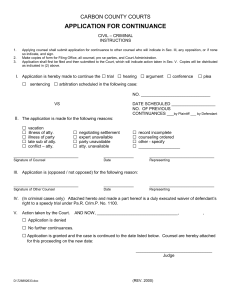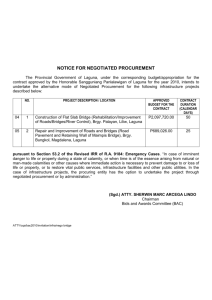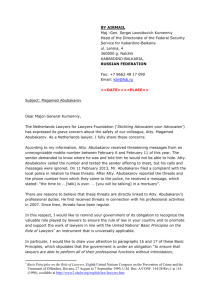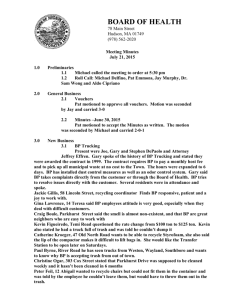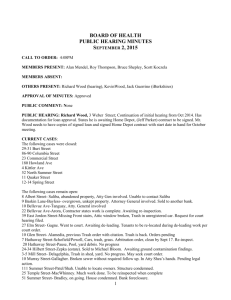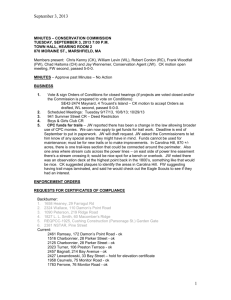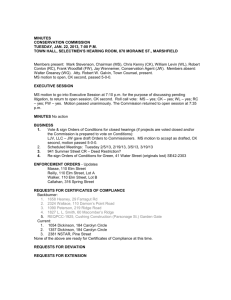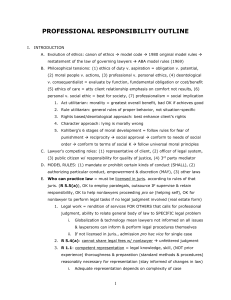Legal Profession (Law 210) Fall 2000 Course Outline
advertisement
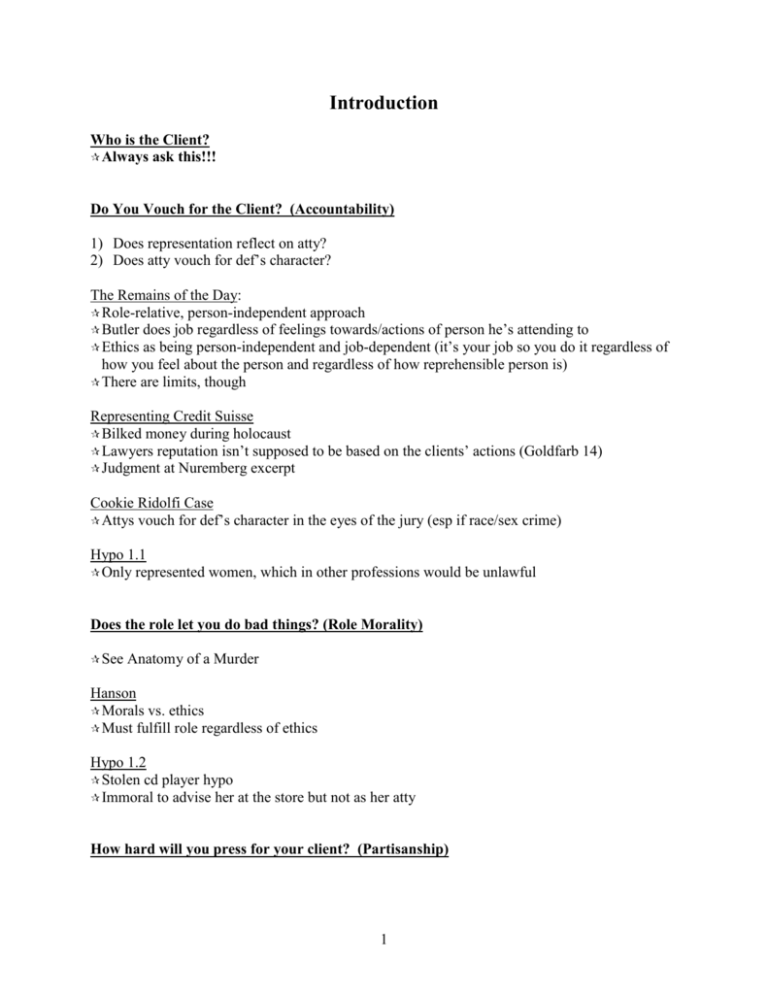
Introduction Who is the Client? Always ask this!!! Do You Vouch for the Client? (Accountability) 1) Does representation reflect on atty? 2) Does atty vouch for def’s character? The Remains of the Day: Role-relative, person-independent approach Butler does job regardless of feelings towards/actions of person he’s attending to Ethics as being person-independent and job-dependent (it’s your job so you do it regardless of how you feel about the person and regardless of how reprehensible person is) There are limits, though Representing Credit Suisse Bilked money during holocaust Lawyers reputation isn’t supposed to be based on the clients’ actions (Goldfarb 14) Judgment at Nuremberg excerpt Cookie Ridolfi Case Attys vouch for def’s character in the eyes of the jury (esp if race/sex crime) Hypo 1.1 Only represented women, which in other professions would be unlawful Does the role let you do bad things? (Role Morality) See Anatomy of a Murder Hanson Morals vs. ethics Must fulfill role regardless of ethics Hypo 1.2 Stolen cd player hypo Immoral to advise her at the store but not as her atty How hard will you press for your client? (Partisanship) 1 Partisanship Examples The Devil’s Own: taking partisanship too far win at any cost A Man for All Seasons: won’t prosecute Satan? Spectrum of Partisanship Zealous Adversary: Lord Brougham Quote: "A lawyer knows but one person in all the world and that is the client . . ." Public Interest: "Half of a decent lawyer's practice is telling clients they are damn fools and should stop." Contextualist: "Tell me the case and then I'll tell you how far I'll test the ethical limits." All serve public interest in a way Career Choice & Ethics Ethical codes Not practical ideals First code was Model Code Model Rules are more recent govern today in almost every state but not Cal Cal SC sets codes but legislature does have some say in regulation Restatement of Law Governing Lawyers: will come out soon Rules in Cal: CPRC Basics of Relationship Commencing Relationship Rule: Relationship based on reasonable expectations of client, atty’s knowledge of client’s expectations and client’s reliance on atty’s advice (tort) –OR- if there’s a contract (contract) The reasonable expectations of the client creates the relationship in mind the sophistication of the client as coloring the reasonable expectations of the person Fee agreement not necessary to establish a relationship paying doesn’t make you the client (third parties can pay) and based more on expectations and reliance Must look to caselaw about what commences a relationship (not in MR or state bar act) Keep Togstad Misunderstanding of whether atty represented the lady in medical malpractice case atty got relevant info and told lady she didn’t have a case no fee arrangement discussed Atty must make sure not to create a relationship too hastily Holding: no relationship created must disclaim advice No reasonable reliance if atty writes letter saying no relationship 2 Hypo 2.1 Atty looks at divorce petition w/ obvious error but says nothing couple sues you b/c divorce falls through and their kid is illegitimate should duty extend to unborn child? Overt acts to make them believe you were their atty giving advice, keeping and reviewing forms Or not retainer denied, no fee agreement Mistakes: time deadlines are huge (missing them is an easy way to get sued for malpractice) Client Identity Issues Families, Corporation, Tribes Does representing a "whole" make you counsel for the "parts"? No, if representing corporation you don’t represent shareholders and officers Does representing a "part" make you counsel for the "whole"? Unit 2(c): having a family as a client is a bad idea Who’s the client when you work for the gov’t Duties to Non-Clients Rule: Only exist in narrow and special circumstances, as below Duty of confidentiality to prospective clients and former clients who share information owed to trusts and wills beneficiaries Counsel for a fiduciary (trust fund) has a duty to a beneficiary when the beneficiary is a child Duty Unit 2(d): Intended beneficiaries of will see Cindi Mancias (duty to her and her child?) Representing a fiduciary (beneficiaries of a trust) Control that Relationship Control representation in writing is represented Scope of representation Who Two letters (p 31-32) Is it better to say lots or just have a one-sentence letter (“I’m not your atty”)? Whatever you do, make sure to get it in writing Goals: unambiguous denial of representation, minimize own liability (cover s/l, tell them to get another atty) 3 Terminating the Relationship Termination not in Model or Cal Rules Note CRPC §3-700(B)(1) (mandatory withdrawal) and §3-700(C)(1)(a) (permissive withdrawal) 1) Express termination 2) Termination by drift Test: Reasonable expectations of client Hypo 2.2 Former client’s suit dismissed w/ prejudice can’t re-raise/inactive (but if she’s paying off the debt there can be new proceedings) Should it be assumed the relationship continues until actual notice given? No guarantee of actual knowledge May allow premature termination (if something better comes along) 3) Effects of Termination belong to client must return immediately (CRPC §3-700(D)) atty recovers proportionate value of her legal services compared to the total value of legal services rendered to the client in the matter Files First Hypo 2.3 Get fired by long-standing client client owes money but atty has files termination is clients way to get out of paying legal fees If you don’t have files you must sue (but beware of malpractice countersuit) to recover Keep a copy of the files in case of suit But probably won’t be paid Should ask for retainer up front Hypo 2.4 Prior atty of your client makes a claim for part of the recovery hadn’t done much Confidentiality & Privilege The Critical Distinction Confidentiality: wide duty (MR 1.6) very limited right to not answer questions even though under oath But coincide 99% of the time Privilege: 4 Attorney-Client Privilege Rule: Client holds the privilege atty can’t waive it w/o client consent Waiver: Intentionally and deliberately revealing a confidence When client sues atty for malp, or when the info becomes part of the case Failure to object to disclosure Inadvertent disclosure (document productions) Ok if atty is acting w/in scope of representation/authority Circumstances approach to whether waiver is made Confidentiality Rule: Can’t reveal confidential info (info that relates to client, resulting from representation, other than what is generally known) Exceptions: “May” reveal confidences if atty has (objectively) reasonable belief that client’s actions will be a criminal act resulting in imminent death or substantial bodily harm Defense of lawyer MR 1.6 (p 66) Duty of confidentiality to potential clients where it’s reasonable for potential client to think so Duty of candor to court expressly trumps MR 1.6 duty The legislative history shows that expansive exceptions were trimmed back. 1.6 originally said “a lawyer shall . . .” which placed a duty on lawyers to revel the criminal act thing now it’s “may reveal” but they almost never do Restatement §117 (p. 85) Broader provision than Model Rules but MR applies to states Don’t need to know! Policy Look at law when it’s ok to reveal (objectively reasonable standard) Look in heart follow your conscience Add §1.6(b)(3): if gov’t is your client you can reveal wrongdoing Current proposal to delete “imminent (death or…)” and replace w/ “reasonably certain” California's Uncertain Rules In Cal, no exception under rule of confidence are persuasive authority in Cal and they fill in gaps in Cal law but they’re not the law in Cal MR 5 CRPC No rule on keeping mouth shut (but see conflicts rules mentioning "confidential information") Duty about any info relating to representation California Business & Professions Code §6068(e) seemingly prohibits any disclosures California Evidence Code Revokes privilege on grounds of crime/fraud exception (§956) No privilege if atty reasonably believes the disclosure is necessary to prevent client from committing criminal act that is likely to result in death or substantial bodily harm (§956.5) A/c communication for the purpose of furthering a future or ongoing crime or fraud isn’t privileged, even when atty is unaware of client’s purpose Can’t disclose freely, but also can’t refuse to answer question if under oath Social Implications of Confidentiality and Privilege 1) Whistleblowing WSJ article Silent Partners (46): Corporate counsel who try to expose/reveal conduct by their employer Breach: not covered by MR 1.6 to expose info Not protected by laws got fired and sued Must make sure the corp actually broke law (not just was unethical but legal) Bad things happen to attys who breach confidentiality California Department of Insurance Article Revealed confidences to legislative staffers (political opponents) could’ve gone to law enforcement or the press Got rehired by DOI b/c she had (by state law) a right as a public employee to reveal public wrongdoing Bar decided not to prosecute even though they said she didn’t do right thing Ethics in Ashes Tobacco industry uses a/c privilege/confidentiality to hide info included in scientific research Should corporations have a/c privilege/confidentiality 2) Cooper House Hypothetical making threats is it ok to reveal them? 1.6 applies b/c Amy is a client Client MR 6 Amy’s actions probably won’t result in imminent harm (MR 1.6(b)(1)) but some attys may have a reasonable belief that she’s a danger (if so, may reveal) In Cal, no exception under rule of confidentiality MR are persuasive authority in Cal and they fill in gaps in Cal law but they’re not the law in Cal See comment 5, p 152 In real case, atty sought expert guidance Issued dodged b/c Amy committed crime in interim and was removed from Cooper house You can hire atty and ask her or (p 152) to a diagnostician Noble thing: bearing the consequences of revealing info 3) Disclosure of Life Altering Information Spaulding v. Zimmerman (p 38) Car wreck pl’s son injured a severe injury (aneurysm on aorta) didn’t get discovered until after settlement def knew of injury but didn’t disclose settlement overturned Ct must approve settlement b/c it was a minor Vacation of the judgment affirmed Mistake and unconscionability Ct said def’s atty didn’t have to disclose to pl but did have to disclose to ct i.e. if pl wasn’t a minor there wouldn’t have been any req to disclose to ct (and pl couldn’t get decision vacated) 4) Receiving Information You Should Not Have Rule in Cal (MR): You If you get a document you shouldn’t be reading you shouldn’t even finish reading it just notify other lawyer would be disqualified (i.e. not paid) notification necessary Immediate Umbrella Article One lawyer accidentally sent a premature settlement agreement to opposing lawyer first atty fights w/ mail people to get it back How pressures affect regular lawyers Hypo Firm Website A/c relationship is formed when confidentiality attaches Firm website w/ a “contact us” button Acme sends e-mail wanting to know about advertising laws forwarded to atty who represents competitor e-mail contains info that would allow competitor to sue, can atty reveal its contents? Website should have a disclaimer that the site can’t create an a/c relationship should be prominent and large Maybe there should be a box that pops up before the e-mail is sent saying that a/c relationship isn’t created 7 Hypo 3.1 1) Committed a crime last week and told atty p and c 2) Tells atty they’re in the middle of a stock swindle confidential but not privileged b/c of crime-fraud exception (§956) 3) Client and friend say they’re about to breach a contract not privileged b/c of third party (§952) but confidential b/c relates to representation but not generally known 4) Ongoing fraud is confidential?? Duty: Loyalty to Client To Determine Conflict of Interest 1) Is representation adverse to current or former client? 2) Who is client? 3) What is scope of representation? Rules MRs 1-7-1.12 1.7: conflict of interest general rule/current client rule (concurrent representation) 1.8: transactions between atty and client/pecuniary interest of client 1.9: conflicts w/ former clients (successive representation) 1.10: extent to which disqualification of an atty is imputed to other attys 1.11: atty can’t utilize gov’t employment for private gain 1.12: former judges and arbitrators Cal Rules (CRPC) – (p 707) 3-300: doing business w/ client 3-310: conflict of interest a) definitions e-mail is ok for a waiver b) written disclosure necessary when: current or former relationship w/ someone affected by representation financial interest c) true conflict need informed written consent if potential or actual conflict (3) current client rule you would be representing a client you’re already adverse to f) third parties can pay legal fees if certain conditions are met Mess, compared to MR 8 Current Client Rule (MR 1.7) Rule: Can’t be adverse to current client unless it’s reasonable to do so, and/or there’s a valid waiver and consent In Cal, informed consent is req’d waiver in writing Get Spectrum of Adversity A) Directly Adverse: Suing, negotiating, patents Representing two entities isn’t directly adverse Even if conflict doesn’t fall w/in ethics parameters, business commands you don’t enter into such relationships Can sue current clients if consent obtained Hypo: two attys in same firm represent clients suing each other Ok if clients consent Attys won’t play dirty lots of incentives for clients B) Representation Materially Limited: Hypo: sexual harassment claim against corp you represent suing bank but CEO is best friend could alter representation P 88 paragraph 4/3: economic competitors excepted (if the representation is on unrelated matters related matters are a conflict) Hypo: Former Client Rule (MR 1.9) Rule: Can be adverse to former client unless 1) Material confidence that’s adverse 2) Matter now is substantially related to former (CL balancing test) material confidence is assumed 3) Consent Cal 3-310(e): Can’t be adverse to a former client if you obtained confidential info adverse to the former client that’s applicable in the present interest But can be adverse if no confidential info (to either current or former client) rule says yes, cts say no 9 MR 1.9 (a): former client must consent No actual exchange of confidential info req. just a substantially related matter Treating Corporate Affiliates Represent parent corp, is it ok to represent subsidiary or sister corps? Rules in Cal split: 1) Represent parent, can sue subsidiary a) Each corporate affiliate (entity) is distinct unless you can pierce the corporate veil and go after the assets of the individs in the corp 2) Balancing Test: Cts consider client’s reasonable expectations of whether a/c relationship exits, any significant interaction between attys and the affiliate, and overlap of legal/factual issues, staff or officers of the two corps a) (Morrison Knudson) look for overlaps and see if confidences are flowing between affiliates b) Make sure there’s not too much overlap between two entities The "Hot Potato" Doctrine Rule: It’s a breach of the duty of loyalty to fire a current client to be adverse to them Can Just fire client for no reason, or just b/c you don’t want to represent them anymore can’t fire to pick up new work against them Imputation and Lateral Movement of Attorneys Rule: When attys move jobs they take actual confidences they learned (but not all knowledge from old firm is imputed on attys) Rule: Atty’s knowledge is imputed to all attys w/in atty’s firm or legal dept Resolving or Curing Conflicts Rule: If there’s a conflict, atty can: 1) Get informed written consent (after informing current/former client of relevant circumstances and reasonably foreseeable adverse consequences) 10 2) Use equitable defenses (laches, waiver, estoppel ex they’ve known for nine months so they waived (money and time already put in), you relied) Ethical Walls Switch jobs: take actual confidences Ask that atty’s actual confidences not get imputed to new firm As long as this atty doesn’t share confidences is it ok if they work …on your case, in our firm…and they were adverse to you Bilateral ethical walls Getting consent Must: 1) Promise to maintain former clients’ confidence 2) Deny the former atty access to files and documents 3) Not discuss matter around that atty Unilateral ethical walls Doing it w/o asking Trend of doing it increasing but Cal’s really strict about it Cal Rules (MR 4.2 and Cal Rules) that unilateral walls ok when: 1) Attorney moving from government employment to private employment 2) Former judicial officer 3) Non-attorneys (paralegals, secretaries, etc.) 4) A single attorney disqualified for ethical improprieties (bad ethics not imputed) Hypo 4.11 and Cylink for PKP partnership to license patents H and C represent PKP in a suit against TRW RSA and Cylink get into another dispute and Cylink wants H and C to represent them RSA Former Client Rule: Who is the former client? PKP not RSA Doesn’t apply b/c RSA isn’t a former client But RSA was part of party H and C represented in this case representing the entity is representing the constituents So RSA is a former client Did H and C get confidential info / was the TRW case substantially related? Not substantially related Even if not, if material info is shared then H and C disqualified Patents were for different things MR 1.9(c): can’t sue info gained in representing RSA in future matter against RSA 11 Hypos Hypo 4.1 Apply MR 1.7 Representing Z against A after you represented A it must be reasonable and w/ client consent (and can’t use confidential info) Hypo 4.2 Rule: can’t fire a current client to be adverse to them (hot potato rule) MR 1.9(a): can’t represent A against B unless you get B’s consent Initial client interview Fact finding to determine conflict situation Look for witnesses, people who are affected, etc Who administers trust Other relatives Material witnesses and adverse parties Trust beneficiaries Who drafted the trust agreement Let’s say B of A administered the trust and they were a client 18 months ago: What was the matter? How did they part? What is firm’s custom? See Cal 3-310(B)(1) Hypo 4.3 Current client (ASM) Were there any conflicting representations? No Everyone sues everyone Mechanics lien: placing stake on bldg BCC spun out possible confidentiality issues Problems: Future litigation Potential bad blood Zeal/Diligence/Competence Rules downplay zeal and focus on diligence: MR: zeal w/in bounds of the law MR 1.1: competent representation Cal 3-110(b): diligent (thorough) Attys like it, academics hate it (embarrassing and excessive) Cases (especially criminal still mention zeal) accepted in appellate opinions See also partisanship 12 In re Walker Lack of communication about costs and steps taken in two measures No prejudice to client matters to ct Discipline: calbar.org Two views of competence and diligence: atty as service provider in market vs. atty as champion Disclosure Rule: In settlement demands, must: 1) Communicate w/ client b/c client can be bound to accept or reject by what atty says 2) In Cal only writing settlement offers must be passed on MR 1.4 Rule: did you mention atty fees Reasonably informed decisions CRPC 3-500 & 3-510 Rule: did you consult before agreeing (3-510) 3-510(a)(2): settlement offers In re Cooperman Trial Autonomy & Paternalism Rule: Clients decide objectives and attorneys decide strategies and tactics MRs 1.2 & 1.14 MR 1.2: MR 1.14: Lawyer shall abide by client’s decisions as to objectives, atty can decide strategy and tactics (major division) Except where there’s a mental disability the lawyer can decide Objectives client decides Settle 13 Dismiss w/ prejudice Criminal pleas Add or drop a defense Waive claim or defense Strategy atty decides Calling witnesses Discovery Theories to emphasize Arguments Paternalism Definition: interference w/ individual’s liberty for the individual’s best interest Ex helmet laws Justifications for paternalism Decision making is impaired (young, crazy) Individual is under stress or coercion Individual misunderstands values at stake i.e. they got decision wrong Individual makes valid choices but doesn’t have will or ability to effectuate choice Individual making permanent choice that causes harm and can’t be fixed (life and death) Objections to paternalism Individual is the best judge of his own interest Individual’s right to choose what’s in her best interest Objections have flaws People can make disabled, stupid choices or decisions that don’t preserve life, health or wealth (which we consider faulty decisions) People always have/need input on choices Three limitations on paternalism 1) Burden of proof on interferer to justify intervention 2) Interference justified when failure to intervene would cause irreparable harm 3) Interferer must use least restrictive means How well can the law evaluate client choices? Choices Choices concerning the generalized means (life, health, and property) to a variety of ends? that are religious, whimsical, quixotic, ideological? 14 Autonomy for Corporations Not human, so decisions don’t affect lives like human decisions do attys have more intrusive relationship b/c not human maybe There should be more paternalism whistleblowing would increase Can Sioux Nation Case (Hypo 7.1) Rule: Client defines the objectives and atty defines the tactics/strategy overwritten w/o supermajority Sioux wanted land back but lawyers went for money damages attys win dams but Sioux won’t touch it Treaty Who is the client and who speaks for the client? Cong defined who speaks for the nation Should attys educate subjects? Should clients be allowed to pursue the land, regardless of impossibility, to make a point? Sue on principle Isn’t it the client’s decision? How can atty understand people when they’re not in person’s shoes other values besides money Whose values are paramount? Atty: money Client: land Unabomber Case Whose decision should it be to mount he insanity defense? abides by client’s decision (MR 1.2) except if client has mental disability (MR 1.14) Standard for representing yourself is low Unabomber probably satisfied it Lawyer Tram Nguyen's Case (Hypo 7.2) Motives: Investigator: none Partner: outcome impacts firm’s rep and relationship w/ judge or prosecutor Judge: busy, wants quick deal Teresa: paying fees, tired of abuse Tell client potential outcome 15 MR 3.2 (?): who gets to make the decisions Present costs and benefits Make sure you cover yourself Writing and witnesses that you explained costs and they made own decisions Misc Hypo Hypo 7.3 Is atty req’d to tell the client about her demise? Urge her to ask the dr.? Request the pertinent info from her She must know about her condition Ethics In Civil Litigation See outline in handout Misc Truth vs. winning: trial attys way to win a trial: plausibility over truth Dealing w/ perjury (tab B) MR 3.3 If atty goes to ct before being informed s/he can’t remedy anyway Is willful blindness ok? Best Rules Can’t give false facts or intend to mislead MR 3.3 May have to reveal more if it’s ex parte (a)(4): can’t offer evidence you know is false if it’s material and false you must remedy (b): must disclose even if protected by MR 1.6 (c): may refuse to offer evidence you reasonably believe is false Local Rule 14.8.2 (p 58) Steer away from live testimony, depo transcripts Cal Rules Can’t remedy perjury b/c no confidentiality exceptions Should talk to client and withdraw 16 MR says you must remedy For criminal perjury you can use the narrative technique but can’t argue it in the closing Theories of Adjudication Ethics Adversarial/Zealous/Standard Model Monroe Freedman Example: if I can delay case w/o getting sanctioned and I can win, I should Public Interest Model Public has a stake in the outcome the correct result being achieved MR 1.2: attys have leeway to consider public interest Also MR 1.6 Example: no stalling if it prevents adjudication on the merits Contextual Model How hard atty pushes depends on who s/he thinks ought to win Ethics tailored to who atty thinks should win See also: Anatomy of a Murder, Hanson Witness Prep Tab D, p 10 examples non-client witnesses, there’s no privilege so the other party can ask about the preparation If it’s your client privilege can be more aggressive in preparation b/c it won’t be questioned W/ Abuse/Uncivil Litigation Frivolous litigation Hard to define but no test know it when you see it Prohibited by many sources: MR 1.2(d), 3.1, 3.2 Rule 11 of Fed Rules of Civil Procedure CCCP Civil torts: abuse of process and malicious prosecution See tab A, II Discovery abuse Fisons case (tab C) Attys didn’t turn over two smoking gun docs They objected but said they’d turn them over Brand name and active ingredient were used interchangeably at times 17 Have to answer questions as asked (see p 29) Georgias Plato/Socrates on litigation The Duty of Candor (see outline on duty of candor) Rule: Can’t give false facts or intend to mislead Tell truth or lie to court Atty duty regarding witness perjury Cal Rules Can’t remedy perjury b/c no confidentiality exceptions Should talk to client and withdraw MR says you must remedy Cooper House Hypo Intentional misstatement to tribunal (MR 3.3(a)(1)) Past record (p 57) depo High school graduation depo Amy was present Made to judge Possibly false MR 3.3(a)(4): if it’s material and false you must remedy MR 3.3(b): must disclose even if protected by MR 1.6 Local Rule 14.8.2 (p 58): steer away from live testimony, depo transcripts Hypo: Arbitration Hearing If you offered evidence you know is false, you have to remedy even if you find out it’s false later Win a case client says “do you want to know what really happened?” Don’t have to go down and listen to “what really happened” Rule 3.3 (a)(4): “I’ll tell you the real story” doesn’t count as evidence of material falsity as long as you’ve not been told what is false (if anything) Clinton Case Tab E and p 78-79 Whatever questions they ask, insert “sexual relations” into the answer No perjury b/c the record was unclear Ethics in Criminal Litigation Should criminal defense ethics be different? 18 power of state vs. lone individual lopsided asymmetry not found in civil cases Doing justice vs. winning Rationale: Witness Prep Criminal For defense attys have lots of latitude to say “I didn’t know it was false” criminal perjury can use narrative technique, but can’t argue it in closing See outline in handout Different Jobs Prosecutors Defense "do justice" wins (within the bounds of law). Geoff Hanson – Fed. Public Defender Issues: Ill-trained officers Knowing a perp is guilty and tweaking evidence (plain view) Huge liberty ramifications Morals vs. ethics Ethics: have obligation to tell client the law Morals: encouraging client to lie Avoid ethical problems by asking no questions Laurel Bieller – US Attys Office Prosecutors must police the process in addition to prosecuting the case No legal obligation to present exculpatory evidence to grand jury B/c of sentencing guidelines, all the discretion is w/ prosecutor (charging, pleas, etc) Easier to prosecute b/c it’s considered doing justice Hardest questions about criminal defense: Can you put a perjuring client on? Yes Can you lecture on the law when you know it’ll affect testimony? Yes Can you destroy truthful witness on cross exam? Yes Ethics in Negotiations MR 4.1: No false statements or failure to disclose 19 MR 4.1: Duty of Candor, or Norms of the Marketplace? Can’t lie but can play games (generally accepted activities of marketplace) Rule comment: What’s a fact depends on circumstances Amount of settlement isn’t a fact Affirmative misstatements allowed in real estate situations if one big corp wants to buy four parcels but doesn’t want homeowners to know who they are Negotiator’s Role Can’t lie to ct In negotiations, can’t make lie or omit facts and build it into the deal But what about zealous representation and confidentiality duties? The Melian Dialogue Become more Melian if you negotiate w/ the same people constantly Silence as Representation? Under contract law, silence can be an assertion when the fact in question concerns a basic assumption of the negotiation and failure to disclose would violated good faith and reasonable standards of fair dealing. Rest. (2nd) Contracts, section 161(b). Under tort law, silence can be an assertion when you have a duty to speak, or when you have spoken incorrectly or misleadingly, or regarding facts basic to the transaction is you understand the other party is proceeding on a mistaken basis. Rest. (2nd) Torts, section 551. Under the ethics rules, attorneys have a duty of confidentiality. MR 1.6; Cal. Bus. & Prof. Code section 6068(e). Games negotiators play Puffing: statements that are so vague, open ended and hyperbole that they can’t induce reasonableness Good cop/Bad cop Threatening to call the cops/extortion What the MR 4.1 comments refer to as conventions of negotiation. Misc Hypos Hypo 13.1 Is it a failure to disclose a material fact? Was the misleading conduct part of the deal? Rule comment: what’s a fact depends on circumstances 20 Amount of settlement isn’t a fact Affirmative misstatements allowed in real estate situations if one big corp wants to buy four parcels but doesn’t want homeowners to know who they are Hypo 13.2 Ok by the rule b/c amounts aren’t statements of material fact May not be smart b/c other side may just walk out Settlement authorization is a huge pitfall for attys get written authorization! MR 8.4: comments in 4.1 govern here, not this rule Just discipline, not specific to negotiations Hypo 13.4 It’s ok as long as it’s a non-frivolous claim This is a familiar pattern and judges try to blunt this Hypo 4.14 Negotiation issues Cleans as snow S/l issue Self-aiding terms in negotiation Sweeter deal in final docs Dodging e-mail Parentco wants to sell Division to SP and Victor Division incorporated as NewCo before the sale Puffing: context matters Parking lot statement ok but if he’d said it in an e-mail it’d be bad Maybe can add extra terms in negotiation as long as they aren’t given at expense of actually desired terms Law Firm Life Is a law firm a pyramid scheme? Yes and no The billable hour and what is means to you Debt Getting into the firm you want Getting something out of the firm Umbrella story Malpractice Elements of the Tort Duty Standard of care Breach of ethical rules is different from breach of standard of care (maybe) 21 of rules isn’t grounds for malp Ethical rules are a standard of care, though In Cal, ethical rule violations can be some evidence of malp Breach Breach Causation Damages General Info Must prove: had atty done job properly pl would’ve won the case If pl would’ve lost, it doesn’t matter how big the blunder is Not negligent to take case out of area of expertise, but must be competent Must advise clients of all potential claims Can’t threaten to report somebody to the bar just to get something out of them that’s grounds for malp No malp case is won w/o an expert Lots of attys are sued after suing client for fee claims and vice versa Malpractice insurance Solo practitioners get sued for malp more Also get hit more by state bar large firms have influence on bar so they don’t get in trouble Don’t have as many resources Easier to fudge financial records Case within the Case Easy to prove malp Blown s/l Failure to communicate settlement offer In Cal, poor performance at trial is proven by putting on a trial w/in the trial All evidence from the first trial is presented Jury returns a value for the original case Lawyers’ original trial roles are reversed Pl in original case becomes pl in malp case Must prove they would’ve won original case but for atty’s negligence Must also prove their claim in original case was legit (not just that they would’ve won, but that original def was guilty) Pl’s atty in original case becomes def in malp case Must prove that pl would’ve lost original case (even w/o the negligence) Must also prove that original def wasn’t guilty 22 Steve & Kathleen's presentation The impact of Ethics Rules How ethics rules are used in malp cases: Define the standard of care But MR not meant to do this even says that in MR preamble Are evidence of the standard of care Get witnesses to say local practices are different Are irrelevant To whom is the duty owed Clients Beneficiaries of clients? Malp Hypo Botched root canal Attys can get judgmental immunity: should put memos in the case file saying “I considered a, b and c . . . “ S/l: Bad: atty relies on client for dates should get medical records or other independent verification Independent Verification Should atty be req’d to get independent verification or are they entitled to trust client? Look at Rules Is it a breach of the standard of care not to verify? consider unsophisticated client Beyond Expertise Is it negligent for atty to take case outside area of expertise? No, but you must be competent (Rules) Atty must be careful how they advertise themselves don’t say you specialize in something if you’re inexperienced at it Atty must advise clients of all claims Dentist’s alcoholism Incl telling spouse about loss of consortium Atty was below standard of care in: 23 Not finding out whether there was an arbitration clause Not fighting motion to compel arbitration lose jury trial, unappealable Expert witness: Atty couldn’t afford to handle case Expert wasn’t competent Expert knows atty not unbiased (will get grilled by opposition) Trial w/in the Trial Poor performance at trial is proven by putting on the dental malp case w/in the atty malp case all evidence is presented For malp, must prove pl could’ve avoided arbitration clause and would’ve gotten a different result at jury trial Jury returns a value for the medical malp case Rushton’s atty tries to prove: They would’ve won against the dentist but for McDonald’s negligent conduct –and The dentist committed malp McDonald’s atty must prove: Dentist didn’t commit malp –and Rushton would’ve lost even w/o McDonald’s mistakes Ethics in Public Interest Law Client Identity Issues Representing the cause Representing the person Should be dealt w/ in retainer agreement Representing Classes Easier to represent classes: atty has broader discretion in objectives and settlement Ct must approve Unless there’s a split in the class then representing them is hard Who speaks for the class? The role of the representative plaintiffs Class action impact litigation can have ancillary claims for personal damages Divisions within the class Pluralist approach (see public interest law class handout) Majority approach (see public interest law class handout) Opt-out procedure Judicial oversight of settlement 24 Class actions are good b/c Resolution isn’t wholly dependent on one person (who may freak out) Can pick best witnesses Money/Settlement/Atty Fees Source of Public Interest Money Public interest lawyers get their money mostly from donations but some atty fees Debate over whether to take a % of the common fund (a contingency fee) or just an hourly fee How does the source of the money affect their practice of law? Public interest orgs at a disadvantage b/c they depend on fees Sometimes getting paid is more important than winning Private firms draw out cases b/c they’re paid by the hour this also sweats public interest orgs b/c they need money Atty Fees Settlement offers conditioned on waiver of attorney's fees Atty can’t say no settlement, if pl wants to take it Conditions of settlement should be dealt w/ in retainer agreement Atty can’t settle w/o client’s approval Collusion settlement: Atty settles for low amt but high atty fees Atty settles for coupons, etc Atty settles for the class, but only a few people in the class are eligible to collect Atty fees: Must make client know they’re taken out of settlement Sometimes judges will award them on top of settlement Speakers Jeff Selbin: EBCLC Shiela Thomas: Equal Rights Advocates of San Francisco Ann Hayes: Pacific Legal Services (Foundation) (PLS or PLF) Guy Wallace: Legal Aid Society of San Francisco Hypo Rule: atty can’t say “no settlement” if client wants it Perfect claim/proof/judge but pl wants to settle and walk away def will settle but wants confidentiality agreement Who’s the client, Roe or the cause? deal w/ in retainer agreement Urging client not to accept a settlement betrays their interests Wouldn’t happen in private sector Exotic Dancers Hypo Attys sometimes get ripped for the causes they represent 25 Public perception matters to public interest orgs b/c they need to have credibility Some legal services depend on federal funding Can get cut depending on politics Cong can dictate what kinds of cases the $ can be used for Exclusion & Marginalization in the Law CRPC 2-400 Bases of Discrimination Law school attended Grades Invidious discrimination Hypo 20.9: woman asked not to be trial atty in front of jury b/c of accent Bigot’s Veto The impact of family life Division of labor in family affects work salary Speaker: Lawyer’s Committed for Human Civil Rights Race a problem in jury selection Playing on stereotypes Common theme! The Trial in re Cooperman Conflicts of Interest Adequacy of explanation and waiver Communication with client What Went Wrong? Attys disciplined Note: messing w/ money always leads to severe discipline What did they do wrong? Morehouse guy Client neglect Delayed filing 26 Canned brief didn’t include stuff on felony statute (didn’t investigate) Bearded guy: forgery Alcoholic: client neglect Social worker guy Let s/l run for civil suit and other things Took forever to tell client about missed s/l What do they have in common? Solo practitioners w/o being ready for it Unreal expectations Drug or alcohol use Need careful bookkeeping Need support network Financially strapped Organizational problems Their indiscretions weren’t discovered until some time after they were committed They all seemed to want other careers didn’t want to get into law Are they being honest with us? Who knows? was, Morehouse guy wasn’t, others were in-between Alcoholic Client Identity Issues Random Hypo Atty gets to murder scene takes pictures w/o calling police Duty to call? Has atty become witness? Did atty tamper w/ evidence? 27
